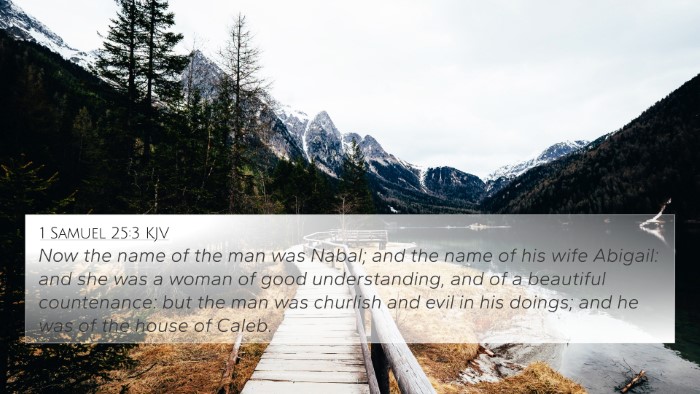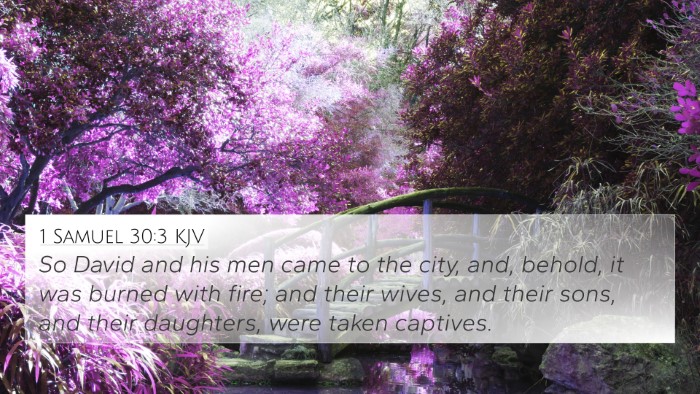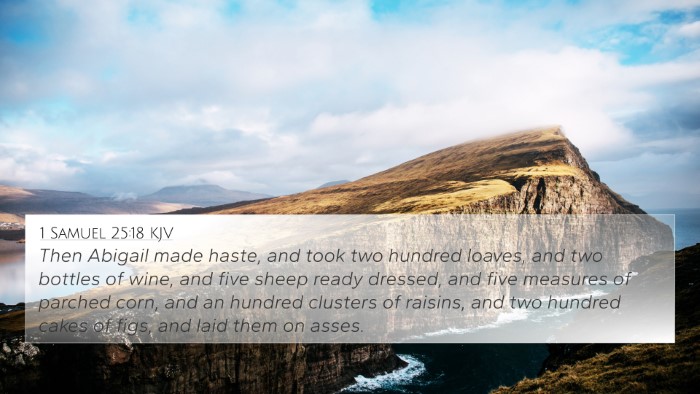Meaning and Analysis of 1 Samuel 27:3
Verse Context:
1 Samuel 27:3 states, "David resided in Achish's city of Gath with his men, about four hundred men." This verse marks a significant moment in David's life as he seeks refuge from King Saul.
Summary of Interpretations
This verse is pivotal as it showcases David's decision to align himself with the Philistines. Various public domain commentaries offer insight into its significance.
Matthew Henry Commentary Insights
David's Need for Safety:
Henry emphasizes that David, while fleeing Saul, sought comfort and security in the land of the Philistines. This action reflects his desperation and the complex relationship he had with the enemies of Israel.
His Leadership:
This narrative underlines David's role as a leader since he brought his men—about four hundred—along with him, indicating both a following from loyal supporters and also the growing tension between David and Saul.
Albert Barnes Commentary Insights
Political Maneuvering:
Barnes discusses the political implications of David residing with Achish, denoting that this was a strategic move to gain protection but also a precarious position as it might require allying with the oppressors of his own people.
Human Weakness and Faith:
Barnes also touches on the notion of human frailty in the face of pressure, arguing that David's choice reflects his humanity and the trials he faced, which may resonate with many in their own struggles against adversity.
Adam Clarke Commentary Insights
David's Strategic Relocation:
Clarke presents the idea that David’s relocation to Gath was also a calculated risk, suggesting that living among the Philistines might afford him a new kind of strength and alliance.
The Foundation of Future Alliances:
This choice set a foundation for future alliances and was a precursor to David’s eventual kingship, signifying the complexities of leadership and the intertwining fates of nations.
Cross-References
-
1 Samuel 21:10-15 - This passage describes David's prior encounters with the Philistines, setting the backdrop for his later decision to reside among them.
-
Psalm 34 - A psalm attributed to David during his time in Gath, reflecting on God's deliverance amidst fear.
-
1 Samuel 30:1-6 - This portion details David’s return to Ziklag, highlighting the consequences of his earlier choices and their impact on his leadership.
-
2 Samuel 5:17-25 - These verses narrate David's battles after becoming king, reflecting on the outcomes of his earlier strategies.
-
Hebrews 11:32-34 - These verses discuss David's faith and bravery, providing a contrast to his actions in seeking refuge.
-
Proverbs 24:16 - This verse encourages resilience, mirroring David’s perseverance through difficult times.
-
1 Chronicles 12:8 - This passage describes David's mighty men, illuminating the leadership qualities needed in times of trial.
-
Philippians 4:6-7 - Encouraging believers to seek peace and safety in God, similar to David's desire for refuge.
-
Romans 8:28 - Speaks to the idea that all things work together for good, a notion applicable to David's tumultuous journey.
-
Matthew 26:56 - Reflects on abandonment in crucial times, similar to what David faced with Saul's pursuit.
Thematic Connections
Faith in Wilderness:
David's journey can symbolize the broader theme of seeking refuge during times of distress, a prevalent motif throughout scripture.
Human Choices and Divine Providence:
This episode serves as a reminder of the interplay between human decision-making and God's overarching plan, a fundamental topic in biblical theology.
Conclusion
In summary, 1 Samuel 27:3 presents a crucial moment in David's narrative, reflecting on themes of leadership, alliance, and the complexities of faith in perilous times. The combined insights from various commentaries provide different facets of understanding, allowing us to probe deeper into the text.
Related Keywords:
When exploring this verse, individuals may seek information regarding connections between Bible verses, cross-referencing biblical texts, and tools for Bible cross-referencing to deepen their understanding of these intertwined narratives.







